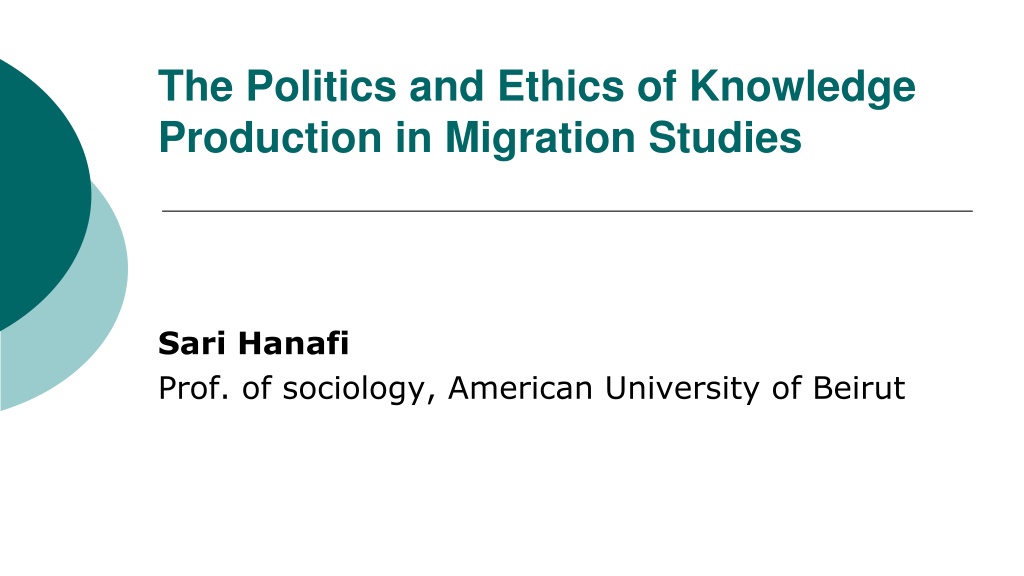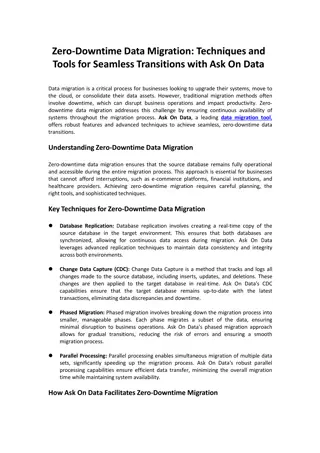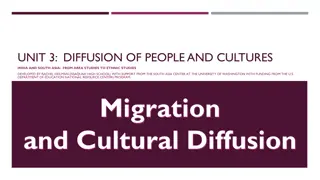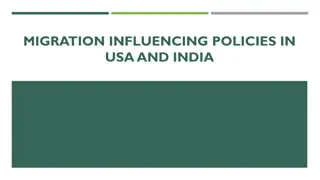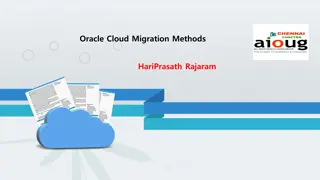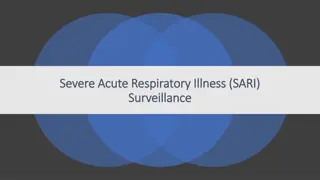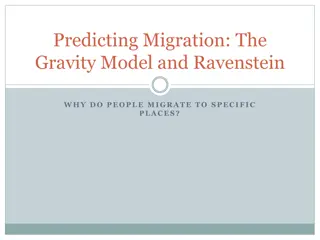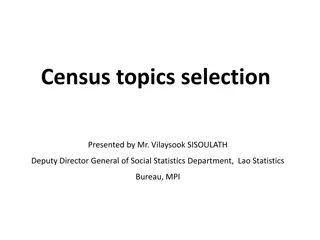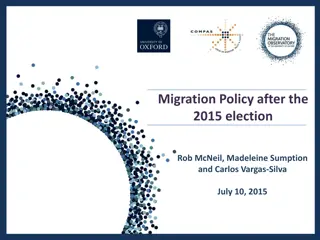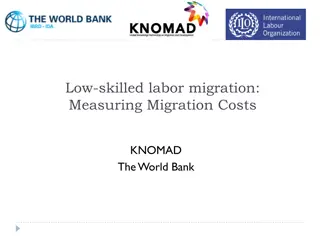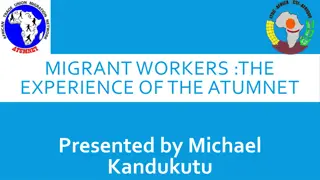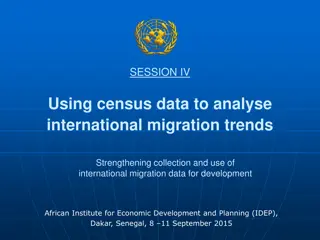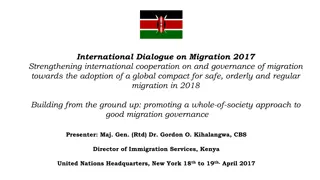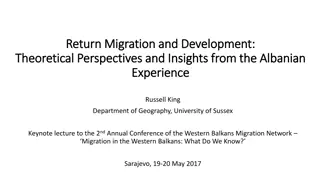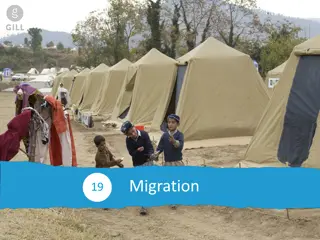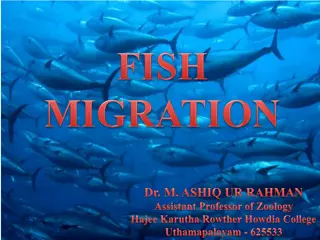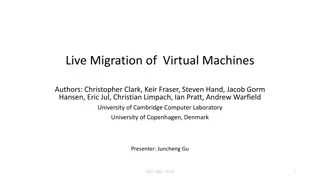The Politics and Ethics of Knowledge Production in Migration Studies by Sari Hanafi
This insightful study delves into the politics and ethics surrounding knowledge production in migration studies. It explores the normativity of migration studies, identity politics, and universalism, while emphasizing the importance of ethics and epistemic community. The discourse also touches upon the instrumentalization of migration, with a critical analysis of scholarly work, media representations, and the impact of political regimes.
Download Presentation

Please find below an Image/Link to download the presentation.
The content on the website is provided AS IS for your information and personal use only. It may not be sold, licensed, or shared on other websites without obtaining consent from the author. Download presentation by click this link. If you encounter any issues during the download, it is possible that the publisher has removed the file from their server.
E N D
Presentation Transcript
The Politics and Ethics of Knowledge Production in Migration Studies Sari Hanafi Prof. of sociology, American University of Beirut
Identity politics and universalism Outline Normativity of Migration studies: Ethics and epistemic community Yet, who tell the stories? Politics and instrumentalization of migration Four blind spots in knowledge
Normativity of Migration studies: Ethics and epistemic community Analysis of 85 articles inform us as to how researchers have negotiated both their ethics of conviction and responsibility Ethics of conviction: maximization of principles/values without regard to cost/conse- quences of principled action Ethics of responsibility: optimization of principles and consequences of action They constitute an epistemic community that negotiates with and constantly combines both ethics Since the 1990s, there has been a qualitative and quantitative leap in studies concerning immigrants religion, acknowledging their colonial past and their religious diversity. They espouse the major long-standing normative claims of Liberalism: neutrality in the public sphere, the universal application of human rights, the requirement to treat all subjects equally and the prioritization of economic and political liberty. Multiculturalism: the politics of recognition and acknowledgment of cultural specificity and communitarian life neo-enlightenment: expansion of enlightenment original project (secular-liberal, pluralist, democratic, egalitarian, inclusive, rationalist and humanitarian society). It is more a way of life rather than a political movement and a culture where the production of performative, problem-solving ethical orientations supersedes the application of overarching moralities coming from on high
Yet, who tell the stories? Scholarly work knowledge: For whom? For what? Media Think-tank
Politics and instrumentalization of migration Discourse of crisis The refugee crisis in Europe is over. 2018: 116,647 crossing the Mediterranean, 89% reduction compared to 2015 Yet, heavy instrumentalization of migration by populist parties and media Regimes played successfully to people's need, establishing fake facts and truth, hence endangering democracy.
The ideal subject of totalitarian rule is not the convinced Nazi or the convinced Communist, but people for whom the distinction between fact and fiction (i.e., the reality of experience) and the distinction between true and false (i.e., the standards of thought) no longer exist.
Agnotology This post-truth situation worldwide Robert Proctor s agnotology: socially constructed and politically imposed ignorance. Building on concepts such as structural amnesia, non-thinking and states of denial, agnotology refers to a social theory of ignorance that supposes that ignorance is pervasive and can be politically advantageous. Ignorance thus is not a simple omission or gap , but something that is made, maintained, and manipulated .
Agnotology and selectivity of empirical rigor The migration issue is the leading topic of this situation of indistinction between fact and fiction, yet Many supporters of the Syrian regime were glad of their ignorance of the systemic torture of that government and enter into state of denial when confronted with any and all reports produced by AI and HRW about the massive violation of human rights by the regime. This includes the 21,000 people eliminated in the regime s prisons. There is in fact a trend of empiricism that is disconnected from discussing the political economy or the moral imperatives of justice and the respect of UDHR. Requests for scientific empirical rigor are often selective in the face of overwhelming evidence and becomes a technique of denial
First blind spot: The sea as a new geopolitical space of solidarity The shore constitutes a space of contestation between encroachments of sovereignty and expansions of solidarity. Kosmatopoulos: Borders are not any more separating two sovereign states but a salient gap in terraqueous sovereignties in which solidarity s groups and politics have occupied it
Greek Gaza Freedom Flotilla Turkish ship Mavi Marmara
Second blind spot: Integration and identity politics: Role of Religion Crisis of secularization in multicultural and multi-religious societies. KP focused often on the black side of religion and developed the concept of group-focused enmity. Minority Religion: helping migrants in their new home. Migrant religion forces a tremendous transformation of the religious landscape. Majority religion may be a source of xenophobia or xenosophia. Streib and Klein 2018: goes beyond the pathogenic model that accounts for xenophobia, Islamophobia, toward a salutogenic model xenosophia: the wisdom, creativity and inspiration that emerges from the encounter with the stranger and the strange religion. centrality of religiosity has positive effects on the welcoming of war refugees, the appreciation of religious diversity, and on the view that Islam fits in the West Cognitive transformation in the migrant worldview.
Surge of the islamophobia Islam gained such a strong foothold and justify its qualification as a new religious minority in Europe. Increased with the terror that stroke Europe by ISIS. Many Europeans were blind to the fact that ISIS has had its terror attacks not only in Paris and Barcelona but much more in Idlib, Deir Zour, Raqqa, Mousil, and Ankara. Age of the surge of identity politics, where people are either forced to be assimilated or are pushed into isolation The media become galvanizer of such politics by focusing on the Burqa and veil while neglecting the major social dynamics of most of Muslim communities in Europe. 82% of Muslim in Europe are non-practicing. Legalism
Third blind spot: Working the universalism No migrant integration without multiculturalism and universalism Three conditions for a concept to be a universal Outcome of a quasi-cross-cultural consensus Not a teleological concept, but a historical experience that gets its normativity as a result of a collective historical learning process (inherently open-ended). universality as an imaginary not a model to be exported.
Blasphemy Is blasphemy is a right in France? A universal value tout court? Should we see whether it entails incitement against minority that has its fragile status as citizens/migrants? Blasphemy is now hailed not just as a right but a kind of duty Todd: Yes.. there s a right to blaspheme, but one must also have the right to say that blasphemy is not a priority and that it s idiotic I was demanding the right to counter-blaspheme: to say that the caricatures of Muhammad were obscene, rubbish, totally historically out of sync and the expression of rampant Islamophobia. And, for saying that, I was accused of complicity with the terrorists. Jamel Debbouze
Fourth blind spot: Dialogue Dialogue which is based on ethics rather than legalism. Levinas: the priority of otherness and on the concept of responsibility as the pre-thematic structure of the self, and as transcendence. Responsibility is the affective, immediate experience of transcendence and fraternity. We should as such enter a dialogue while stripping ourselves as much as we can from pre-constructed ideas and prejudices about the others. This will develop the human relationship with migrants or Avant Cogito, il y a bonjour . This is different from I of Cogito of western philosophy, and toward more complexity: being myself, I already ask myself whether my being is justified, whether the Da of my Dasein is not already the usurpation of someone s place. The dialogue is a way to escape many specters that haunt the migration debate of security and criminalization. politics of compassion and politics of pity
